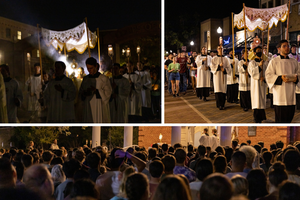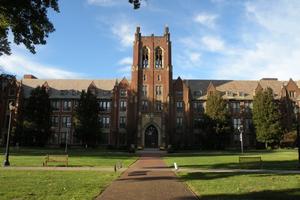Encountering the Eucharist: How Colleges Around the Country Are Responding to the Eucharistic Revival
With hearts set aflame for the Eucharistic Lord, students adore Christ on campus.

Eucharist-centered community is emerging on college campuses across the nation.
For a number of Catholic colleges or colleges with active Catholic centers, the U.S. bishops’ call to Eucharistic Revival supports and corresponds with Eucharistic reverence already being promoted and fostered on campus.
Perpetual adoration, time in the daily schedule for Mass and confession, and promotion of Holy Hours in dormitory chapels or at a central on-campus chapel have created a culture in which love for the Eucharist is not only encouraged, but is central to student life and growth.
Hearing from students and staff at these college campuses, Eucharistic devotion is alive and well in our country, and the U.S. bishops’ call for a Eucharistic Revival has been well-received.
Fostering a Culture of Eucharistic Devotion
For Sophie Cummings, a senior at Thomas Aquinas College in Santa Paula, California, the integration of the curriculum at the college promotes Eucharistic coherence. “If we’re studying God, we have to spend time with him,” she told the Register. “Because the Eucharist is God himself, reverence for the Eucharist is the way to spread the Christian kingdom on earth.”
Father Greg Markey, chaplain at Thomas Aquinas College’s campus in Northfield, Massachusetts, emphasized the necessity of building a Eucharist-centered campus community:
“Fostering devotion to the Eucharist is not so much about implementing a program, but more about encountering a community that already has an active devotion to the Eucharist,” Father Markey said. “Once people encounter a community that is already living a Eucharistic-centered life, piety in the best sense of the word, then other people can tap into it. This is the way revivals have always happened in the Church’s history, through monasteries and religious communities that are firmly rooted in their worship and love for the True Presence.”
In order to make Eucharistic devotion as accessible as possible, Father Markey said that Thomas Aquinas College “has three Masses a day and makes sure that there are no other activities scheduled during the Masses (not even classes), so everyone has the opportunity to attend daily Mass,” as well as ample opportunity for adoration and a nightly recitation of the Rosary.
These types of opportunities are common across the colleges interviewed for this article, representatives told the Register.
The result has been hearts set aflame for the Eucharistic Lord.
Cultivating a Personal Love
College students have indeed found deep, abiding and personal relationships with the Lord.
Lewis McAdow, a doctoral student in music at the University of Illinois involved in liturgical ministry at St. John’s Catholic Newman Center, is a recent convert. Meditating on what it was like to long after the Lord before he could receive him in the Eucharist, he said that “one of the most profound things I recognized during that waiting was how meaningful the prayer of the Mass was.”
“Each movement mattered, and I realized that they not only signified but re-presented a moment of Christ’s passion,” he said. “I was at Calvary. Or, rather, Calvary was here with us: that Our Lord’s death resounds through eternity. As I patiently waited, I knew that he was right before me upon the altar. I knew that he is as present in the Eucharist as he was upon the gibbet of the cross. And I knew that I was ready to be united to him.”
For Adam Boyle, now a graduate student studying for a master’s degree in theological studies at Franciscan University of Steubenville, attending college on a Catholic campus has strengthened his devotion to the Eucharist.
“I started going to Mass every day and receiving Holy Communion frequently as soon as I started my freshman year, and that habit has continued now in the last year of my master's degree,” he said. “This has coincided with visiting the perpetual adoration chapel for an hour every day, even if it means waking up early and losing an hour of sleep so I can still keep up with homework and my other duties.”
For Boyle, Eucharistic devotion is not only a hallmark of his college experience, but the way he intends to begin living out his marital vocation.
“Now that I am planning my wedding for next summer,” he said, “my fiancée and I have made it a high priority to plan a Holy Hour of Eucharistic adoration with confessions before the rehearsal so that we can beg for the grace and mercy of Jesus to strengthen our marriage.”
Clare Glemkowski, a senior at Franciscan, sees our Eucharistic Lord as the center of human life.
“Everything that we do, everything that we are, it all can be rooted back into the love that comes from the Eucharist. … This call to revival has encouraged me to … allow myself to be fully changed by the Eucharist,” she said.
Similarly, Taylor Mulqueeney, a senior at the University of Colorado-Boulder, said, “I love that we have Jesus present here in the Eucharist at [St. Thomas Aquinas] Catholic Center; that way, after a long day of classes, you can stop by even if for a few minutes, to offer up everything to him and allow him to transform your day. It’s a really pivotal part of our community, and we encourage each other to center our lives around Jesus in the Eucharist.”
For Legionary Father Ryan Richardson, chaplain at Benedictine College in Atchison, Kansas, both his love for the faith and priestly vocation were inspired by the Eucharist.
“My deepening in my Catholic faith happened through a profound encounter with the Eucharist on a retreat in high school,” he said. “I wouldn’t be a priest now without devotion to the Eucharist. Regular adoration in college allowed the vocation of priest to materialize. I want our students to have a similar experience as I did in college.”
Similarly, Franciscan Father Shawn Roberson, chaplain at Franciscan University, credits the Eucharist for his priestly vocation.
“Personally, it’s the fundamental reason I’m a priest,” he told the Register. “I had a pastor in college in my hometown who encouraged me to take some time [before the Eucharist]. It showed me the relevance and importance of adoration. Adoration is so critical to my life as a priest and as a Franciscan priest. Every morning during the week we have Eucharistic adoration … before morning prayer. It is such a gift in the priesthood and to the rest of the Church.”
Lighting the Fire
For a number of the colleges highlighted in this article, Eucharistic processions are either a long-held tradition or a direct response to the U.S. bishops’ call to Eucharistic Revival.
Ave Maria University senior Garrett Hallinin notes how the school year began with such a procession in Ave Maria, Florida: “At the beginning of the semester, [Franciscan] Father Rick Martignetti, the head of campus ministry at AMU, led a Eucharistic procession, bringing the Eucharist into each dorm. This was a good reminder for us students that the Lord is actively among us in the dorms.”
Father Martignetti added, “Ave Maria University is, of course, consecrated to Our Lady. I personally believe that she is the best one to teach us Eucharistic reverence. Students are encouraged to go to her in prayer, to consider how tenderly she held and loved Our Lord especially in his infancy, and to imitate her gentle, loving reverence at every Mass, when they come forward to receive Our Lord in the Blessed Sacrament.”
The University of Dallas hosted a procession on Oct. 1. After a Mass celebrating the memorial of St. Thérèse, there was a time of adoration, the Rosary and Eucharistic procession across campus. The event drew 150 participants both from campus and the local community.
Staff member Karen Bless, assistant to the chaplain and rector at the University of Dallas, who attended the event, told the Register, “The students and staff of UD have a deep love for Our Lord in the Eucharist. They were happy to participate in the procession, serving as altar servers, lectors or just reverent adorers of Jesus Christ. My hope is that they will take their profound love for the Eucharist and bring that light and joy into the world, so that everyone they encounter, whether on or off campus, will know the love of Jesus Christ for each and every person.”
To deepen Eucharistic devotion on its campus, Benedictine has created a plan for the three years of Eucharistic Revival that involves forming students through experiences like a lecture series on the Eucharist this fall; increasing devotion to the Eucharist through perpetual adoration and a Eucharistic devotion lecture series in fall 2023; and extending Benedictine’s mission beyond campus. One way the school hopes to extend its mission is by forming students to be Eucharistic missionaries.
Father Richardson added that in 2024 there are plans to “entrust the campus to our Eucharistic Lord.”
Grace Behm, a Benedictine senior, puts it this way: Missionary work “starts with our families.” When students return home on breaks from school, they will be formed to share their experiences at Mass and adoration. Further, Behm said, “We have the opportunity to share what we’re learning in our theology classes, which can then spread to the community and to the culture.”
The extension also continues post-college, she added, “Once we graduate, we can bring this love to the communities we’re in and our jobs.”
Lindsey Weishar writes from Kansas City, Kansas.
- Keywords:
- catholic colleges
- national eucharistic revival
- eucharistic adoration
- real presence
- blessed sacrament

















